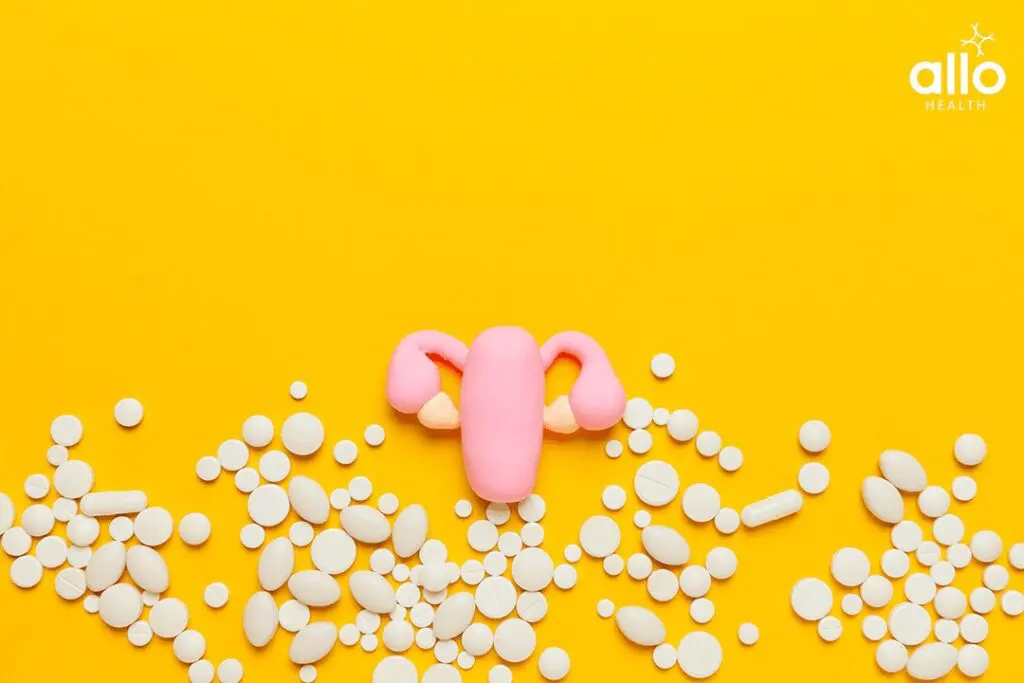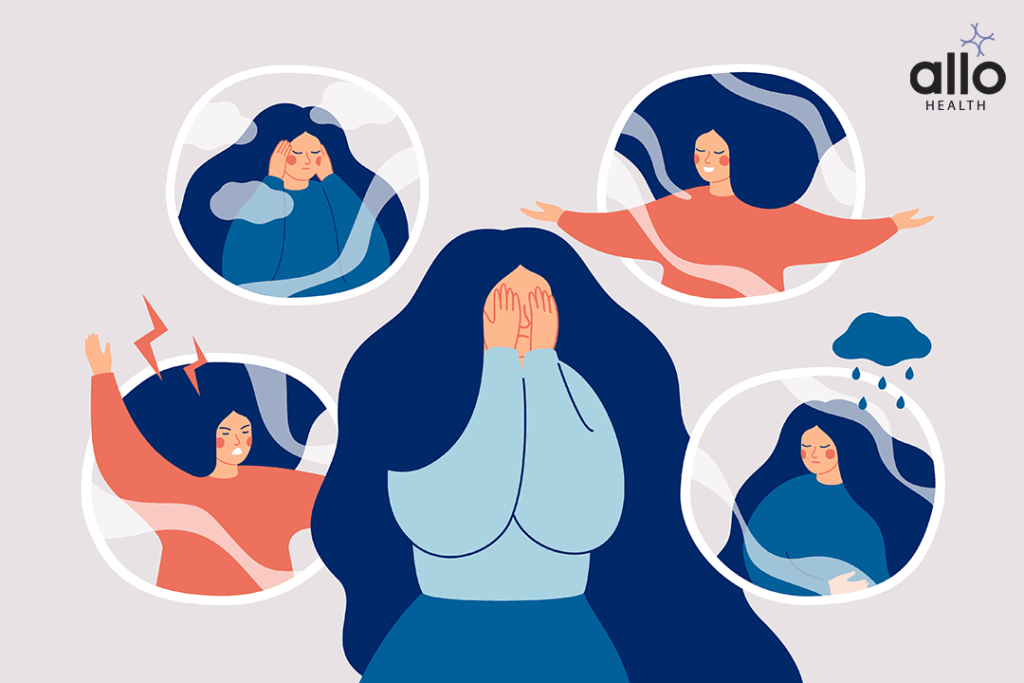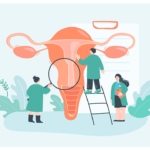Empower Yourself: Spotting the Symptoms of Vaginismus

Allo Health is dedicated to personalized well-being, offering support and trusted information tailored to individual health goals. The platform emphasizes human-generated content, led by a distinguished medical team of experts, including physicians and sexual health specialists. Their commitment to credibility involves rigorous fact-checking, authoritative research, and continuous updates to ensure accurate, up-to-date information. Allo Health's unique approach goes beyond conventional platforms, providing expert-led insights and a continuous commitment to excellence, with user feedback playing a crucial role in shaping the platform's authoritative voice.

An early career psychiatrist with extensive experience in general adult psychiatry, relationship issues, psychosexual problems & special interest in sexual medicine, disorders with addictive behaviours and Obsessive Compulsive disorders. He is an astute physician with excellent academic record and research experience. He is also a member of World Health Organisation and World Psychiatric Association. His vision and goal for Allo is an inclusive, accessible digital health clinic for psychosexual difficulties.
Why This Was Upated?
Our experts continually monitor the health and wellness space, and we update our articles when new information became available.
Updated on 19 June, 2024
- Article was updated as part of our commitment to diversity, equity, and inclusion.

"The following blog article provides general information and insights on various topics. However, it is important to note that the information presented is not intended as professional advice in any specific field or area. The content of this blog is for general educational and informational purposes only.
Book consultation
The content should not be interpreted as endorsement, recommendation, or guarantee of any product, service, or information mentioned. Readers are solely responsible for the decisions and actions they take based on the information provided in this blog. It is essential to exercise individual judgment, critical thinking, and personal responsibility when applying or implementing any information or suggestions discussed in the blog."
Symptoms Of Vaginismus

-
- Pain or Discomfort During Sexual Intercourse: One of the primary physical symptoms of vaginismus is the presence of pain or discomfort during attempts at vaginal penetration during sex. The involuntary muscle contractions in the pelvic floor can cause a burning, stinging, or tightening sensation, making intercourse painful or even impossible.
-
- Difficulty Inserting Tampons: Vaginismus can also make it challenging to insert tampons. The muscle spasms and tightness in the vaginal area can create resistance, causing discomfort or pain when attempting to use tampons.
-
- Painful Urination or Bowel Movements: Vaginismus may lead to pain or discomfort during urination or bowel movements. The pelvic muscles, which are involved in these bodily functions, can become tense or contract involuntarily, resulting in discomfort or a sensation of pressure.
-
- Anxiety or Fear Related to Sexual Activity: Vaginismus often triggers anxiety or fear surrounding sexual activity. Individuals may anticipate pain or failure, leading to heightened anxiety and a fear of engaging in sexual intercourse.
-
- Guilt or Shame: Experiencing vaginismus can evoke feelings of guilt or shame. Individuals may blame themselves or feel inadequate due to the difficulties encountered during sexual intimacy, leading to a negative impact on their self-image and emotional well-being.
-
- Low Self-Esteem: The challenges presented by vaginismus can contribute to low self-esteem. Individuals may feel a lack of confidence in their bodies and their ability to engage in fulfilling sexual relationships, impacting their overall self-worth.
-
- Difficulty with Intimate Relationships: Vaginismus can strain intimate relationships, as the physical and emotional challenges associated with the condition may disrupt sexual intimacy. Partners may struggle to understand this health condition, leading to frustration or emotional distance.
-
- Limited Sexual Activity: The pain and discomfort experienced during intercourse can lead to a decrease in sexual activity. Individuals with vaginismus may avoid or limit sexual encounters to prevent pain or anxiety, resulting in a significant impact on their sexual satisfaction and overall quality of life.
-
- Avoidance of Gynecological or Pelvic Examination: Due to the fear of pain or discomfort, individuals with vaginismus may avoid or experience significant anxiety during gynecological or pelvic exams. This can make it challenging to receive necessary medical care and screenings, potentially impacting overall reproductive health.

Complications Of Untreated Vaginismus
-
- Reduced Sexual Satisfaction And Intimacy: Vaginismus can cause pain and discomfort during sexual activity, leading to a decline in sexual satisfaction and intimacy in relationships between the couple.
- Difficulty Conceiving: Vaginismus can make it difficult or impossible for a woman to have sexual intercourse with vaginal penetration, which can affect her ability to conceive.
- Emotional Distress: Vaginismus can cause anxiety, stress, and low self-esteem, which can have a negative impact on a person’s emotional well-being.
- Strained Relationships: Vaginismus can cause concerns in relationships, leading to tension and misunderstandings between partners.
- Impact On Overall Health: Chronic pelvic pain and discomfort associated with vaginismus can have a negative impact on a person’s overall physical and mental health.
- Decreased Quality Of Life: Vaginismus can affect a person’s ability to participate in daily activities and can lower their overall quality of life.
- Delay In Medical Treatment: Many people with vaginismus may be hesitant to seek medical treatment due to embarrassment or fear, leading to a delay in receiving proper care.
- Increased Risk of STIs: Vaginismus can make it difficult to use condoms or other protective barriers during sexual activity, increasing the risk of sexually transmitted infections.
- Difficulty Accessing Medical Procedures: Vaginismus can make it difficult or impossible to undergo certain medical procedures, such as pap smears or gynecological exams, which can impact a person’s overall health and well-being.
Risk Factors Of Vaginismus

-
- Psychological Factors: Vaginismus can often be linked to psychological concerns such as anxiety, stress, or past sexual trauma or physical trauma or abuse. Women who have experienced sexual abuse or assault may be more prone to developing vaginismus.
- Lack Of Sexual Knowledge: A lack of understanding about the female anatomy and the sexual response cycle can contribute to anxiety about sexual activity, which may lead to vaginismus.
- Emotional Distress: Vaginismus can cause anxiety, stress, and low self-esteem, which can have a negative impact on a person’s emotional well-being.
- Relationship Concerns: Difficulties in a relationship, such as lack of communication or intimacy, can contribute to the development of vaginismus.
- Cultural Or Religious Influences: Some women may feel pressured by cultural or religious beliefs to abstain from sexual activity, which can contribute to the development of vaginismus.
- Medical Conditions: Certain medical conditions, such as inflammatory bowel disease or skin conditions affecting the vulva, can cause discomfort or pain during sex activity and may lead to vaginismus.

Types of Vaginismus
There are two primary types of vaginismus: primary vaginismus and secondary vaginismus. Let’s explore each type in detail:-
- Primary Vaginismus: This type of vaginismus refers to the condition where individuals have never been able to engage in penetrative sexual intercourse due to the involuntary muscle contractions in the pelvic floor. It is often experienced from the first attempt at vaginal penetration, such as during attempts at sexual intercourse or the insertion of tampons. Primary vaginismus can make any form of penetration uncomfortable, painful, or even impossible.
- Secondary Vaginismus: Secondary vaginismus occurs when individuals develop vaginismus after a period of previously pain-free sexual intercourse. In this type, individuals may have had a period of normal sexual functioning but later experience difficulties with penetration due to involuntary muscle spasms. Secondary vaginismus can be caused by various factors, including trauma, medical conditions, childbirth, menopause, or emotional stress. It can be temporary or long-lasting, depending on the underlying cause and treatment received.

Treatment of Vaginismus
The treatment of vaginismus typically involves a multidimensional approach that addresses both the physical and psychological aspects of the condition. Here are some common treatment options that can help individuals overcome vaginismus and regain control of their sexual health:-
- Education and Counseling: Understanding vaginismus is an essential first step. Psychoeducation and counseling sessions can provide individuals and their partners with valuable information about the condition, helping to alleviate anxiety and promote a supportive environment.
- Pelvic Floor Muscle Exercises: Pelvic floor physical therapy, also known as pelvic floor exercises or Kegel exercises, can help strengthen and relax the muscles involved in vaginismus. A healthcare professional can guide you through these exercises to ensure proper technique and progress.
- Graduated Vaginal Dilators: Graduated vaginal dilators are specially designed cylindrical tools that gradually increase in size. These dilators are used to gently stretch the vaginal muscles and desensitize the area, helping to overcome the fear and pain associated with penetration.
- Cognitive-Behavioral Therapy (CBT): CBT techniques aim to identify and challenge negative thoughts and beliefs surrounding sex and feelings around penetration. Through therapy, individuals can learn coping strategies, relaxation techniques, and methods to modify their responses to sexual stimuli. People can also take marital therapy or couples therapy.
- Communication and Intimacy Exercises: Open and honest communication with your partner is crucial when dealing with vaginismus. Engaging in non-penetrative intimacy exercises, such as sensate focus, can help strengthen the emotional bond and gradually reintroduce sexual activity at a comfortable pace.
- Medication: In some cases, healthcare providers may prescribe medications such as muscle relaxants or topical anesthetics to help manage pain and discomfort during intercourse. These medications are typically used in conjunction with other treatment approaches.
Global Vs Situational Vaginismus
There are two main types of vaginismus: global and situational. Global vaginismus refers to when the condition is present in all sexual situations, while situational vaginismus refers to when it only occurs in specific situations or with certain partners. One of the main differences between the two types of vaginismus is the severity of the condition. Global vaginismus is typically more severe and can be more difficult to treat, as it is present in all sexual situations. Situational vaginismus, on the other hand, may only occur in certain circumstances and may be easier to treat as a result. The causes of vaginismus can vary, and it is important to work with a healthcare professional to determine the specific cause in each case. Possible causes of global vaginismus include a history of sexual abuse or trauma, negative attitudes towards sex, and certain medical conditions. Situational vaginismus may be caused by relationship issues, lack of arousal, or discomfort with a new partner. Treatment for vaginismus may involve a combination of therapy, medication, and exercises to help relax the muscles in the vagina. In some cases, working with a sexual healthcare provider or counselor may be helpful in addressing any underlying psychological issues contributing to the condition.When To See A Doctor
It can be a distressing and isolating condition for those who experience it, but seeking treatment is important for managing the symptoms and improving quality of life. Here are some signs that it may be time to seek medical attention:-
- Pain during sexual intercourse: If you experience pain during intercourse, it is important to speak with a healthcare provider. Vaginismus can cause pain with sex and fear of penetration, and addressing the underlying cause of the pain is important for improving sexual function and overall well-being.
- Difficulty using tampons: Difficulty inserting tampons or experiencing pain while using them can be a sign of vaginismus. If you are unable to use tampons due to muscle spasms in the pelvic floor, it is important to speak with a healthcare provider.
- Struggling to have a gynecological exam: If you experience pain or discomfort during gynecological exams or find it difficult to have one due to muscle spasms, it is important to speak with a healthcare provider. It is important to address any underlying issues to ensure proper reproductive and sexual health.
- Emotional distress: Vaginismus can be a distressing condition, and seeking treatment can improve emotional well-being. If you are struggling with feelings of anxiety or depression related to the condition, it may be helpful to speak with a healthcare provider or a mental health professional.
Frequently Asked Questions
-
- Do only older women experience Vaginismus? It is a common myth that only older women experience this condition, but this is not true. Vaginismus can affect women of all ages, and it is important to understand that it is not a reflection of a person’s age or sexual experience. If you are experiencing vaginismus and are concerned about your age being a factor, it is important to remember that you are not alone. Vaginismus can affect women of any age, and there are treatment options available to help you manage the condition. These may include therapy to address any psychological causes, pelvic floor muscle exercises to help relax vaginal muscles, and gradually increasing the size of dilators used during treatment to help desensitize the vagina.
- Are there conditions with similar symptoms to Vaginismus? While vaginismus is a specific condition with its own set of symptoms, there are other conditions that may have similar symptoms or may be mistaken for vaginismus. For example it can be difficult to differentiate vaginismus from dyspareunia .It is important to understand these conditions and their differences in order to get the proper diagnosis and treatment. One condition that may be mistaken for vaginismus is vulvodynia, which is chronic pain in the vulva that may make sexual intercourse uncomfortable or impossible. Other conditions that may have similar symptoms to vaginismus include:
-
- Is Vaginismus a serious condition? Vaginismus is a serious condition that can have a significant impact on a person’s quality of life and overall well-being. It is a condition in which the muscles around the vagina involuntarily contract, making sexual penetration and even gynecological exams extremely painful or even impossible. If you are experiencing symptoms of vaginismus, it is important to seek medical attention. A healthcare provider can help diagnose the condition and recommend treatment options. Treatment for vaginismus may include therapy, medication, or pelvic floor physical therapy.
- Can Vaginismus cause infertility? While vaginismus itself does not directly cause infertility, it can make it difficult or impossible for a person to get pregnant if they are unable to have sexual intercourse or undergo certain medical procedures. If you are experiencing vaginismus and are trying to get pregnant, it is important to speak with your healthcare provider about your options. While vaginismus can make it difficult to get pregnant, it is not necessarily a barrier to fertility. With proper treatment and support, it is often possible to overcome vaginismus and achieve pregnancy.







































